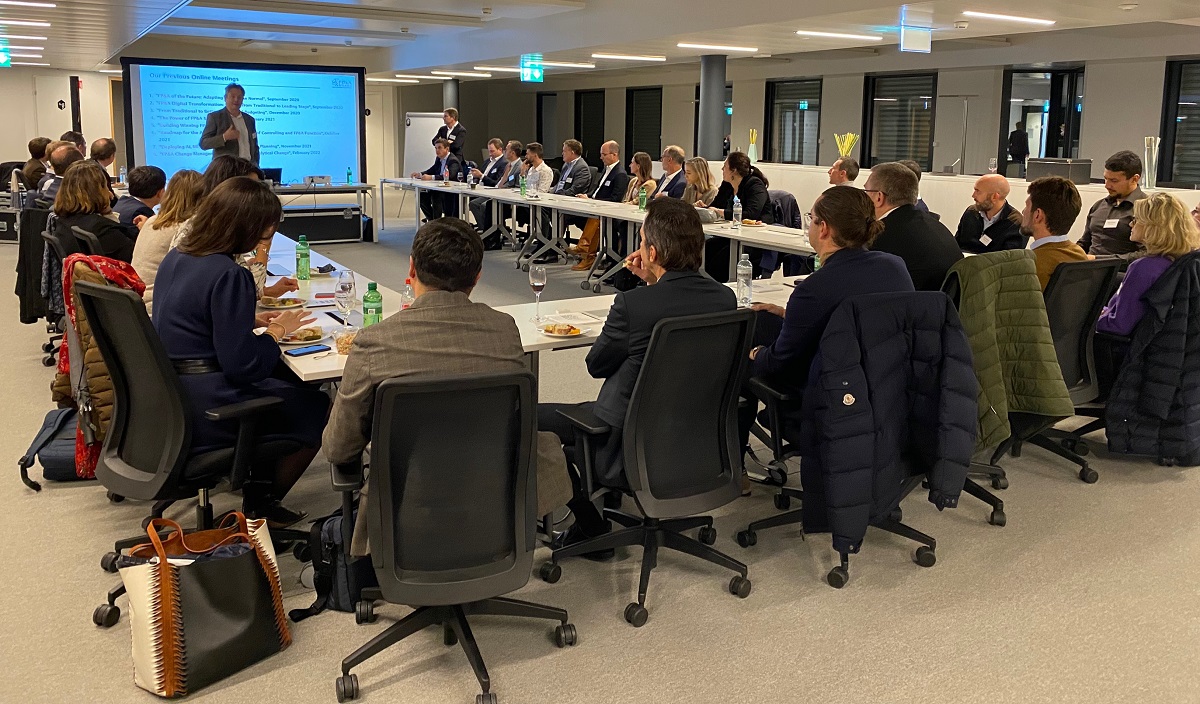On 3 December, we had an interesting debate on why extended planning and analysis (xP&A) is...
Senior finance leaders met at the 13th face-to-face Geneva FP&A Board on November 15th 2022, for an insightful and fruitful discussion. Together they explored the challenges faced when making the journey from FP&A to Extended Planning and Analysis (xP&A).
Stefan Spiegel, CFO at Swiss Railway Freight Logistics (SBB Cargo AG), chaired the discussion.
The Geneva Board comprised more than 40 experienced FP&A professionals representing major companies at home and abroad.
Figure 1: International FP&A Board in Geneva (November 2022)
Introduction
Before examining the key topic of the move from FP&A to xP&A, each member had the opportunity to elaborate on the biggest challenge they were currently facing in FP&A. Among the main challenges cited were:
- Difficulty in forecasting in an uncertain environment.
- Adequately embedding Scenario Planning methodology in FP&A teams.
- Top-down versus bottom-up when it comes to adopting concrete FP&A strategies.
- The need for agility in today’s uncertain corporate context.
- Implementing transformation in FP&A.
FP&A Evolution
The board then moved to the main agenda item: the need for the FP&A function to evolve and change with the times. It became apparent through the discussion that traditional planning methods are no longer cutting it when facing uncertainty in the business world. This uncertainty leads to a need for multiple scenarios on demand, data-driven decisions and swifter actions to be taken to support the business in the best possible way.
Based on concrete examples shared by the Board members, we agreed that it has become mandatory to have the right tools and processes to keep up with these demands and continue to deliver the best in class FP&A. Recognizing the need for the FP&A function to evolve, the conversation naturally drifted towards the subject of xP&A.
What is xP&A (Extended Planning and Analysis)?

Figure 2: The attendees of the International FP&A Board in Geneva (November 2022)
The FP&A Board then shared different definitions in response to the question, “What is xP&A?”.
In our current unpredictable context, xP&A is based on the idea that finance professionals should run scenarios by gathering inputs from different stakeholders in real-time, co-operatively, multi-dimensionally, and at the different levels of an organisation.
xP&A defines the natural way to look at business by harmonising three key planning processes vertically and horizontally as a single continuous process: strategic planning, FP&A, and operational planning and forecasting.
xP&A means aligning business goals between different functions with the integration of people, technology, and strategy.
How Should xP&A Be Implemented?
“Taking the step from FP&A to xP&A requires a combination of several factors”, summarised in our meeting with Stanislas Stoyanov, Director of Finance at Oriflame cosmetics.
According to Stanislav, the implementation of xP&A requires the following:
- Cultural change.
- One single source of information: a core centralised database, pushing stakeholders to agree on one source of data.
- Recognition from all stakeholders that it is a much more complex process.
- A clearly defined framework with responsibilities and key milestones.
The Challenges of xP&A
The FP&A Board then discussed underlying challenges when it comes to implementing xP&A.
Board members who had experience with implementing xP&A pointed out the following:
- the complexities of having agile systems;
- the wish for simplification towards a process that involves a growing number of stakeholders;
- the difficulties faced when implementing through a top-down approach, and
- the challenge of data reliability.
On this last point, Pierre Mounier, Financial Director at The Economist, shared how his company has developed a clear data strategy to generate analytic insights and deliver recommendations to steer the business better. His findings showed that successful xP&A requires trust in data. A healthy balance between bottom-up and top-down is the right approach to ensuring successful implementation.
Focus Groups: Practical Steps for xP&A Implementation

Figure 3: The attendees enjoyed networking during the event
The session ended with the influential FP&A leaders breaking out into discussion groups to elaborate on the key ingredients for xP&A implementation under three key headings:
Data and Models
- Define and design the needed data points (quality over quantity).
- Ensure agility in providing the right data at the right times (flexibility and agility are key).
- Machine Learning and Artificial Intelligence are key in the development of xP&A (and, therefore, should be implemented through a pragmatic method allowing a bottom-up approach to ensure reliability).
Systems and Process
- A blueprint of the system requirements is essential (inputs vs outputs, KPIs).
- The flexibility of the tool (Global vs Local).
- Multiyear view.
- Global framework defining clear accountabilities.
People and Culture
- Executive sponsorship is needed to drive the change and gather stakeholders together.
- Ensure acceptance by all stakeholders (acknowledging the potential difficulties in implementation that will arise).
- A required skillset is critical (especially in the data field) to face the pace of change and technological advancements.
Conclusion
The Geneva Board agreed that xP&A implementation is a natural and needed evolution of the FP&A function in response to business challenges. Its implementation requires time, commitment, and sponsorship. Belief in the xP&A implementation journey, and acceptance at all levels, are essential to its success.
Wolters Kluwer, IWG, and Michael Page Switzerland sponsored the meeting.
Subscribe to
FP&A Trends Digest

We will regularly update you on the latest trends and developments in FP&A. Take the opportunity to have articles written by finance thought leaders delivered directly to your inbox; watch compelling webinars; connect with like-minded professionals; and become a part of our global community.




